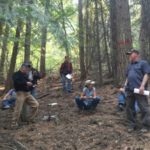Interests vs. Positions
Posted: December 12, 2016Source: The Forest Blog, by Russ Vaagen
What in the world does negotiating interests vs. positions mean? I think they are part of one of the stool’s three legs for successful collaboration. It’s often the one that is most easily overlooked. The three markers for a successful negotiation are:
- Trust between the parties
- Open communication
- Focus on interests, not positions
Collaborative discussions where it matters; in theforest
Most people or organizations create positions or policies to protect their interests. This is a seemingly good thing to do. And what’s wrong with that? There isn’t anything wrong with it, but it can certainly be taken the wrong way and it gives little room for discussion. When parties are trying to solve complex issues, positions can become impediments. When we realize that our interests are much more important to protect than our positions we can find space for a breakthrough.
Let me share an example. A forest products company may have adopted a policy or position against new wilderness designations. And an environmental organization may have adopted a position that supports “zero-cut” or no logging on federally owned forest lands. When we read these it looks like discussions between these parties are a non-starter. And if we stay with those positions there’s little room for either party to gain anything. However, when we start looking deeper into the interests of each we find much more.
Taking a deeper dive into the forest products company we find that their interest is actually having more of the forest to manage. And as we dig even deeper we find those areas they are interested in managing are not areas that have been suggested for protection. These areas are where existing roads already exist and where there has been management in the past. After more discussion, we discover that they are more interested in the small and medium-sized logs, not the largest old-growth trees. This creates a different set of circumstances where the forest products company is interested in thinning overgrown forests in areas that have not been identified as potential wilderness.

An example of a project can meet everyone’s interests. This is afterthinning.
On the other hand, when talking with the conservation groups we find that they want wilderness, but only in areas that haven’t been logged or roaded in the past. When we ask about the reason for “zero-cut” they say their interest is that more road systems and management will threaten special places like Inventoried Roadless Areas (IRA) and Potential Wilderness Areas (PWA). When pressed about the “zero-cut” stance it becomes clear that they share an interest in having healthy forests with reduced fuel loads. If management was done in such a way that wouldn’t take the larger trees and the forest was thinned in the right areas we discover that conservation interests could still be met.
If we look at problems with our interests at the forefront we have much more room to find common ground. This example is essentially what has happened in successful forest collaboratives in the West. We have started by developing trust through communication. While trust was being established, the members of the groups started sharing more about their interests. In this case, the over-arching interest is healthy, vibrant forests. When we begin discussions with interests it provides more discussion space to find solutions. And as we find solutions it reinforces trust.
Some people might read this and think it’s not that big of a deal, but by following this methodology groups were brought together that had basically been at war for years. They all swallowed their pride and set aside their egos to create some very powerful connections. These connections are leading to breakthroughs that will allow all parties to get more of their interests met. If the groups would have stayed with the positions they started with, nothing would have changed. In the end, everyone would have less of what they wanted and all would have continued to suffer as a result.
Next time you find yourself at an impasse, ask yourself, “Am I talking about my positions or my interests?” The result of focusing on interests might amaze you.

